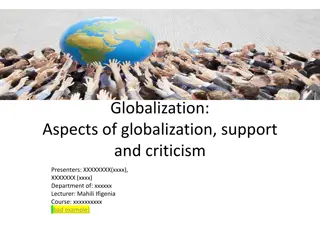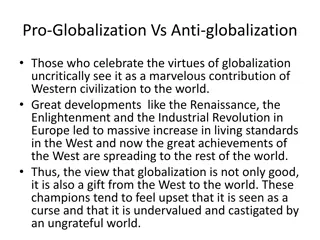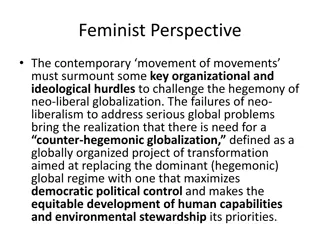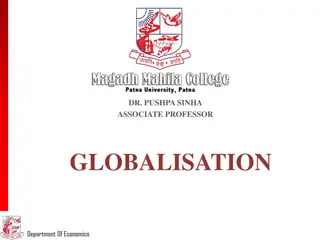Understanding Globalization and the Evolving Entrepreneurial Environment
Globalization is the increasing economic interdependence among countries worldwide, leading to cross-border transactions, technology diffusion, and international capital flows. It facilitates business expansion, erases market differences, and encourages global strategic orientations. Factors influencing globalization include dismantling barriers, overcapacity, technological advancements, and political influences. Entrepreneurs must consider product lines, market selection, entry modes, expansion pace, and competitive strategies to establish a global presence with minimal risk. Market entry decisions should focus on profitable products, market potential, entry barriers, competition intensity, ownership control, and export versus local production policies. Government measures towards globalization involve scrapping restrictive laws and promoting collaboration with multinational companies through joint ventures.
Download Presentation

Please find below an Image/Link to download the presentation.
The content on the website is provided AS IS for your information and personal use only. It may not be sold, licensed, or shared on other websites without obtaining consent from the author. Download presentation by click this link. If you encounter any issues during the download, it is possible that the publisher has removed the file from their server.
E N D
Presentation Transcript
GLOBALIZATION AND THE EMERGING BUSINESS / ENTREPRENEURIAL ENVIRONMENT Entrepreneurship Development and Industrial Consultancy (DBM-421)
Globalization Globalization is the growing economic interdependence of countries world wide through increasing volume and a variety of cross border transactions in goods and services and of international capital flows and also through the more rapid and wide spread diffusion (International Monetary Fund). of technology
Features of Globalization Expansion possibilities of business throughout the world. Differences between domestic and foreign markets are erased. Buying and selling product and service from / to any nation of the world. Establishment of production and distribution facilities based upon feasibility and economic considerations at optimum location anywhere in the world instead of considering national considerations. Product planning and development are dependent on market conditions of the whole world. Optimizing raw material sourcing from entire world. Global orientations in strategies, organizational structure, culture and managerial expertise. Viewing entire globe as a single market.
Factors influencing globalization Dismantling of barriers to international economic transactions. Over capacity and over production. Technological developments. Emerging forms of industrial organizations. Political factors The intellectual revolution Globalization Strategy for Enterprise To establish global presence with minimum risk and maximum returns, the entrepreneur must address following questions: 1. 2. 3. 4. 5. 6. a) Which product line or product lines should be used for launching into global Markets. Which markets should be chosen for entry? Which optimal mode should be used for market entry? How rapidly should the enterprise expand globally? b) c) d)
Market Entry As globalization has many risks associated with it. It is advisable to select only most profitable product/ product lines instead of introducing the entire product range. The choice of the market is decided by market potential. The extent of entry barriers and intensity of competition decides the market entry strategy. Lower entry barriers and less intensity of competition in a market are conducive to a firms entry in the market. The mode of market entry depends upon two factors. Enterprise s policy of export versus local production. Extent of ownership control over locally performed activities.
Government Measures Towards Globalization Scrapping the restrictive laws such as foreign exchange and regulation act (FERA) 1973. The foreign exchange management act (FEMA) has been passed by removing the classes which restricted the entry of multinational companies (MNCs) Allowing Indian companies to collaborate with foreign companies in the form of foreign joint ventures (FJVs) and there by many Indian companies have started their FJVs. Reduction of import tariff to 15 percent on the advice of world bank. Replacing import license with tariffs. Reducing and removing some import duties. Removing export subsidies. Replacing license of export with duties. Imposing low, flat tax on the export income. 1. 2. 3. 4. 5. 6. 7. 8.
Government Measures Towards Globalization 9. Changing the policy related to export oriented units and export processing zones. 10. Liberalizing the inflow of foreign direct investments. 11. Providing incentives to MNCs & NRIs for investing in India. 12. Encouraging foreign institutional investors (FIIs) to invest in India. 13.Allowing Indian mutual funds to invest in foreign equity. 14.Allowing rupee to determine its own exchange rate in the international market without an official intervention. 15. Full Convertibility of rupee in the current account.
Areas of Concern in Indian Economy with respect to globalization The technology gaps of several years. The difficulty in securing technology transfers from the developed countries. 2. Lack of Infrastructure 3. Difficult to implement true privatization policies in the light of political interventions. 4. Indian products and services are rated inferior in terms of price, quality, delivery schedules, etc. 5. High cost economy 6. The market access in the developed countries is very difficult as they are protected by tariff and non tariff barriers. 7. Unstable political economy of India. The coalition governments are not suitable for rapid progress. 8. Limited share in world export. 1.
Globalization and India Indian Industries have globalized their operations so as to satisfy consumer s preferences. Due to liberalization policies initiated by India since 1991, many multinational companies have started their operations in India. The Indian industries and new enterprises face stiff competition from multinational companies.This has resulted in improvement in their performance and ultimately consumers. Globalization helps domestic companies to acquire and update their technology, be cost effective and ward of future competitive threat. benefiting the























